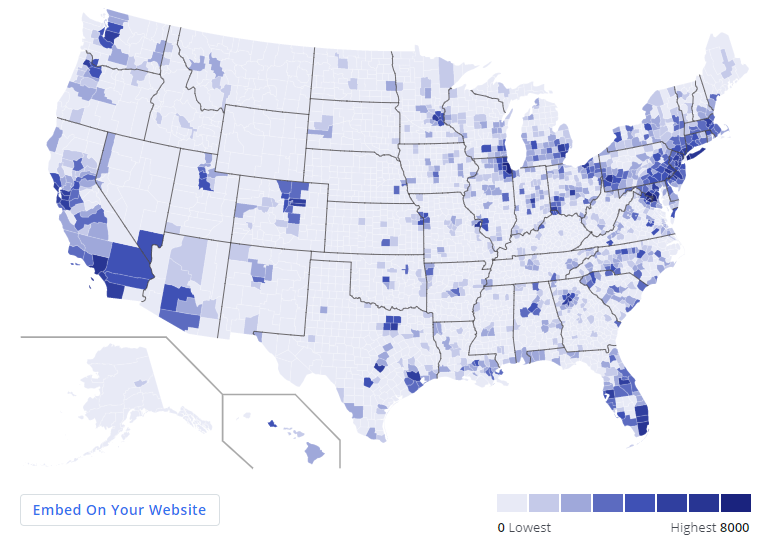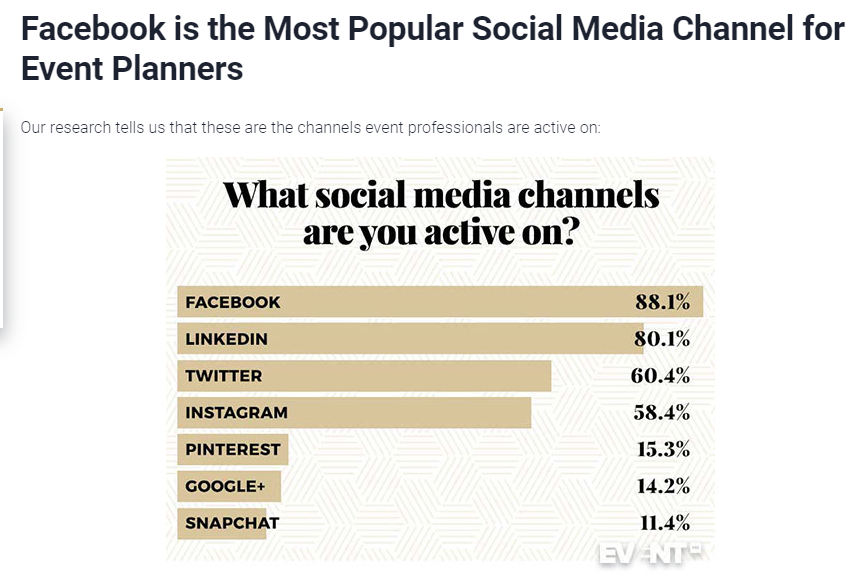Part
01
of one
Part
01
Corporate Events and Conferences
The demographics of professional event planners in the US have been provided. The average event planner is Caucasian, female, 36 years old, and has gone to college. Additionally, the most important things that an event planner looks at when choosing a venue has been provided. Event planners use social media, websites, apps, and publications to get their information. Examples of each have been provided.
Demographics of US Corporate Event Planners
Race/Ethnicity
Age
Gender
Income Level
- 43% have been at their job between one and two years. 19% have been at their job a year or less. This indicates the majority of these professionals are new and still perfecting their skills.
- Women make, on average, $44,312. Men make $43,705.
- The Bureau of Labor and Statistics states the average was $50,600 in May 2019. It is safe to assume it is somewhere between $43,705 and $50,600.
- 63% work full time in the industry and 37% work part-time.
Education
- The most common majors in college for event planners are business, communications, and social sciences. 33.7% major in business and 19.7% in communications.
- Of those that speak foreign languages, 60% speak Spanish, 16% speak Italian, 8% speak Portuguese and 4% speak Japanese.
- The typical new entrant in this field has a Bachelor's degree.
Geographical Information
- The most popular places for event planners is Chicago and New York. An interactive map may be viewed here. A screenshot is shared below.
Customer Journey- Corporate Event Planners
Key Decision Making Factors
- Many planners become aware of potential event locations through hosted buyer programs. These programs seek out event professionals with verified budgets and woo them to select the establishments that participate in the buyer programs.
- Research, conducted with event planners, discovered certain important factors when deciding on an event location. The most important factor was the availability of meeting room information. "The study found that meeting room information is the most important factor in the decision, more than the cost of facility, attractions, exhibit space, food service, previous experience, sleeping rooms capacity and tech support."
- Convene also conducted research and discovered ten different areas that event planners will consider before selecting a venue. In order of importance they are shared below. They are also verified by other blogs and research.
- Location & Accessibility- Planners look for locations that have convenient transportation, or that has a central location to the participants. Parking should be on-site or within walking distance. If valet parking is provided it is valuable to share the details and costs to the event planners. (32 points)
- Meeting Room Capacity- Research revealed that the sweet spot for size was between 100- 125 participants. "Pictures along with feature and layout information can mean the difference between a planner selecting the venue or moving on to find another venue. "(28 points)
- Flow and Layout of Space- Some of the things that planners check for are sightlines, room for social networking, and ease of navigation. If the rooms are private, make sure to state that. If there will be multiple events that day this should also be noted. Every event planner wants their event to be unique. If there are any unique options make sure to state these. (12 points)
- Quality and Capability of AV Equipment- Planners want reliable, state-of-the-art equipment.(12 points)
- Room Flexibility- Meeting rooms should be able to be configured in multiple configurations. (11 points)
- Decor- A space that is clean and adequately furnished are the two things that planners look for first. (7 points)
- Intelligent Staff from Sales to Service- "Competent, emotionally intelligent sales and service staff are always decision-swaying factors for event planners." make sure that planners know there will be support staff available to make their event run smoothly. (7 points)
- Price Flexibility- While some like all-inclusive packages, "some planners expressed a desire to be able to negotiate the fees in order to show their superiors that they were able to lower costs." Additionally, be transparent with all costs. No venue wants unhappy event planners with unexpected costs. (5 points)
- Quality of Food- High quality food with healthy options are desired. They also appreciate a facility that can handle last minute changes. Cuisine is a great way to highlight the uniqueness of the venue. (2 points)
- Participant Experience- Finally, planners want to make sure that guests are satisfied and would want to come back to the venue again. If there are nearby attractions and amenities, share these, as they can make a venue experience more successful. (2 points)
Making the Most of an Online Visit
With the pandemic, many site visits are now conducted online. To make the most of an online visit, consider the following:
- Provide photos of the important aspects of the venue along with a virtual 360 degree tour.
- Share floorplans and capacity charts online.
- Share valuable information like the distance to local attractions, airports, and public transportation.
- Share all amenities that planners will see as valuable. Can they bring pets to the hotel? Does the room have plush robes? Is Wi-Fi available for free?
Sources of Information
Websites
- Bizzabo lists 31 websites that are popular with event planners. On the list are Event Planning Blueprint, Smart Meetings, and Endless Events. The complete list may be viewed here.
Apps
- Stray Boots shared the top 10 apps for event planners. Asana, Boomset, Top Table Planner, Strayboots, Bizzabo, 24me, Blossom, Localist, Pingg, and Planning Pod were on the list.
Publications
- Some of the best publications for event planners are BizBash, a quarterly newsletter; Meetingsnet, an interactive magazine; Special Events Magazine; Meetings & Conventions, a monthly magazine; Catersource, a free magazine of Catersource Conference and Tradeshow; Smart Meetings, a print publication and a highly-regarded online content hub; and Event Marketer. .
- According to Feedspot, the top US industry publications to follow are Exhibitor Magazine, Special Events Magazine, PCMA Convene Magazine, Connect Association Magazine, and Chicago Planner Magazine.
Social Media
- The top 50 influencers in the industry on social media may be viewed here.
Companies That Hire Event Planners
- 11% of companies with between 500-1,000 employees hire event planners. 12% of companies with between 100 and 500 employees do as well. This number rises to 30% when the company has between 1,000 and 10,000 employees. 39% of companies with over 10,000 employees hire event planners.
- 18% of these companies are Fortune 500, 14% are in finance, 10% in technology, 10% in retail, and 7% in hospitality.

